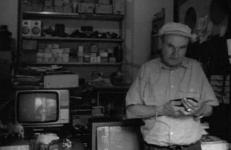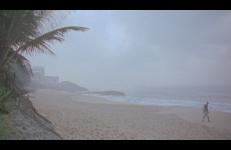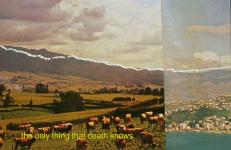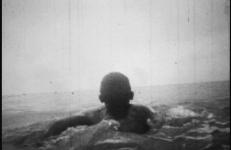This is an audiovisual manifesto in support of people in resistance against a military coup.
Experimental Film
Bracketed by the Fall of Berlin Wall and the Collapse of the World Trade Center, a decade that saw the ossification of the neoliberal project, the rise of third-wave feminism, the proliferation of digital media, and even, perhaps, the “end of history": postmodernism; the emergence of internet; the commercialization of gangsta rap, and independent film; AIDS activist; digital cinema; the Gulf War; rave and riot grrrl cultures; reality television; MTV. A new diagrammatic system.
Approximates a small child’s fantasy world in the dark. In a series of close-ups, the nightlight is transformed into a meditative star-spangled sky. An improvisation, edited inside the camera and shot on a single reel. The stars swirl in silence.
–– International Film Festival Rotterdam
28.IV.81 (Descending Figures) comprises footage Harris shot at a performance of Christ’s Passion, staged as an attraction in a Florida amusement park…This flimsy display of devotion is shown up by something genuinely overpowering, or at least recognizably real. In a way, this seems to sum up Harris’s practice. Filmic images are things with actual impact in the world, and as such they have an unavoidable ethical dimension.
–– Michael Sicinski, Cinema Scope
This is a re-destroyed film that I was unable to finish in 2013. Filmed both in ruins: at the Sutro Baths in San Francisco and in final domestic spaces occupied with a former partner. Film was destroyed in ocean water.
Two University of Virginia grapplers take instruction.
This title is only available on Can You Move Like This: Black Fire.
Two University of Virginia grapplers take instruction.
This title is only available on Can You Move Like This: Black Fire.
These are the western lands of the mind. The western tracks in the land. The western landscapes of our time. The wasted times of our lives. So is the rest of the Capitalocene civilization.
In this interview, American filmmaker, teacher, and video artist Peggy Ahwesh (b.1954) delves into the key figures and primary texts that have inspired her work in Super-8 and video since the 1970s. She discusses her early influences as a member of the underground art scenes in Pittsburgh in the late 70s and Soho’s Kitchen in the 80s. Ahwesh’s experimental hand-processing and controversial subject matter can be traced to feminist theory, and her exposure to underground experimental films, including works by Werner Herzog, George Amaro, Kenneth Anger, Jack Smith and her teacher at Antioch College, Tony Conrad.
A call for a political transformation, a life that emerges from the earth's own interior.
Altamira is the paleolithic and post-human experience of the bloom of cinema. The cinema in a cave, the lightning of his presence, the fire of his birth. The paleolithic and post-human intermittence of the life of cinema. The sacred and contingent permanence of cinema. Part of the Hyperkinetic and Hauntology series.
Altares is an audiovisual shrine composed of small temples that contain images of ancient deities.
It is a tribute of hyperkinetic colors to the Chilean poet Vicente Huidobro in times of pandemic vortex and post-Cubist quarantine. This is Altazor's color drop. Part of the Harmonic and Hyperkinetic Color Film Series.
A portrait of an unnamed city in Italy. Sidestepping the tourist attractions that make the city famous, the film/video posits an almost-imaginary place that draws closer to the reality of its inhabitants. Using a voiceover narration that collages direct observation, literary texts, historical fact, local folklore, and a bit of sheer fabrication, the film/video melds documentary and narrative, past and present.
The Diaspora Suite
Oscillating between a street festival in Philadelphia, the slave forts and capitol city of Ghana, and the New Jersey shore, American Hunger explores the relationship between personal experience and collective histories. American fantasies confront African realities. African realities confront America fantasies.
An all-over textile constructed under the spell of Arachne, an audiovisual textile in five parts that exposes a web of raids in construction over the american houses, a landscape of protests under the webs of segmented time, the entrails of the american factory in movement through the endless american party.
A Kafkian vision of the New World. The arrival of Karl Rossman to the contemporary Babylon under the spell of the paranoid avant-garde. Kinetic coexistence of the archaic forms in dissolution.
The magic life of the objects reanimate the ancestrality of the aesthetic of dream.
A political composition on natural resistance. These images are an expiring breath in danger of extinction. These images become extinguished, consumed: a drop, a pure intensity which only appears when falling. In the presence of the image these audiovisual crowds become an affected body, assaulted by entropy. A face exhausted and reanimated by the continuous sound trance that traverses the battlefield. Faces for an eye that would not need to see.
This is the audiovisual translation of the Walter Benjamin's Theses on the Philosophy of History.
Two bizarrely costumed characters – a human ‘chicken’ in a fat suit, and an elaborate folksy creature called an ‘authenticity fetish’- meet and debate their plight. In an attempt to reconcile themselves with some unspecified trauma of mass biotechnoviolation, these two beings quiz one another in rhyme and animation on the origins and ontologies of their species. A sardonic meditation on the nefarious reality of intensive farming, Artificial Intelligence, and the perils of denying complexity.
The horizon, where the sky and the earth meet, is always elsewhere, a promised place where these two elements come together. A metaphor, an orienting, a promise of transition, change, transcendence. A place where the corporeal and spiritual meet, or are cleaved apart.
Aquarius is a film about horoscopes and hope, and coping with everyday life.
This title is only available on Broad Daylight and Other Times: Selected Works of Kevin Jerome Everson.
Archives recovers the formal community that mobilizes the diagrammatic experience of archives, a formal community that claims the sensory nucleus where hypertrophic rhythms, abstract machines, monuments and memorials, digital servers, corporate architecture, traffic and computer flows, light brutalisms, digital gadgets, detention camps, prisons and hospitals, institutes and academies, universities and housing all integrated in the rhythmic and diagrammatic outburst of the archives.



























